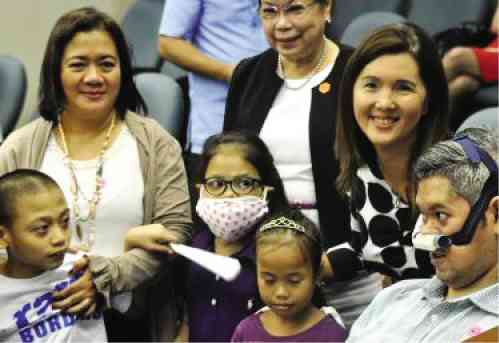Senate bill makes headway to help Filipinos with rare diseases
As Sen. Pia Cayetano watched last September an online video of fellow senator Sonny Angara being doused with a bucket of ice cold water and afterward nominate her to do the same, she realized things were about to get interesting for those pushing for the passage of Senate Bill No. 2098 or the “Rare Disease Act of 2014.”
A few days after that ALS (or amyotrophic lateral sclerosis) Ice Bucket Challenge (this is a social media phenomenon that raised worldwide awareness as well as funds to fight ALS, a rare and progressive disease that affects the nerve cells in the brain and spinal cord and causes muscle deterioration), Cayetano, in a privilege speech last September, she said she hoped that the attention given to ALS can somehow carry over to other rare ailments, and that more work and research may be undertaken to diagnose and manage these rare diseases.
Likened to a rare disease
Cayetano, who is vice chair of the Senate committee on health and proponent of the bill, said that ALS forms part of the 48 rare diseases affecting a number of individuals in the country. She said: “We know very little about (these diseases). Many more remain undiagnosed… My child had trisomy 13, a condition that can be likened to a rare disease. I know treatment for such conditions is expensive. I know sometimes there is no cure. But like any mother, like any parent who has gone through this experience, we live by hope: every day, the hope for a cure, the hope for a breakthrough, even the hope for temporary relief—let us be part of that hope.”
She believes that in order to adequately address such an important health issue, research and data gathering will play a crucial role. Cayetano enumerated some of the key provisions of SB 2098:
- Section 5 of the said bill provides for the identification of persons with rare disease and the creation of a Rare Disease Registry. Healthcare practitioners and health institutions shall be required to report diagnosed cases of rare diseases to the Rare Disease Registry of the Department of Health, and provide reports on the status of patients.
- Section 6 further provides for the referral of patients suspected or diagnosed with rare disease to the Regional Newborn Screening Centers to ensure that the afflicted person receives adequate medical care for his or her condition, and is referred to a healthcare practitioner who specializes on rare diseases.
- Sections 8 and 9 of this bill state that persons with rare disease shall enjoy the same benefits as persons with disabilities, as mandated by Republic Act No. 7277 or the Magna Carta for Disabled Persons.
- Section 19 of the bill states that the Department of Health shall ensure that a system is in place to facilitate the qualification of an afflicted person as a beneficiary of medical management services of a rare disease. Thus, treatment of rare disease shall be included in the benefit package, to be provided in the guidelines set by the Philippine Health Insurance Corp. Further, revenues generated by RA 10351 or the Sin Tax Reform Act shall include medical assistance to patients with rare disease.
5,000 Pinoys
“Almost 5,000 Filipinos suffering from rare diseases are being eyed to immediately benefit from this bill. For years, we have continuously appealing to legislators for the enactment of the Rare Disease Act as it can really provide life-saving measures to our patients,” said Cynthia Magdaraog, president of the Philippine Society for Orphan Disorders, a nonprofit organization that aims to help individuals in the Philippines who suffer from rare disorders.
Said Cayetano during her speech: “Heightened awareness about rare diseases, as well as diagnosis and accessible treatment are crucial if we are serious about helping persons with rare diseases. Poor families caring for a family member with a rare disease have no fighting chance if they do not have access to quality and affordable medical care.”
She believes the DOH should have included rare diseases in its fund allocation. “We passed the sin tax law that provides for budget for universal health care, attainment of the millennium development goals and health awareness programs as well as for medical assistance and health enhancement facilities programs.”
The DOH got an additional funding of P45.1 billion, thanks to sin taxes.
Magdaraog added that the bill is expected to incorporate some minor but important suggestions with the goal that by the end of President Aquino’s term, a law may be passed.
She said: “Let us be realistic, this bill still needs to be reconciled with its counterpart in the lower house. But we hope the President will include this bill among his priority measures.”















